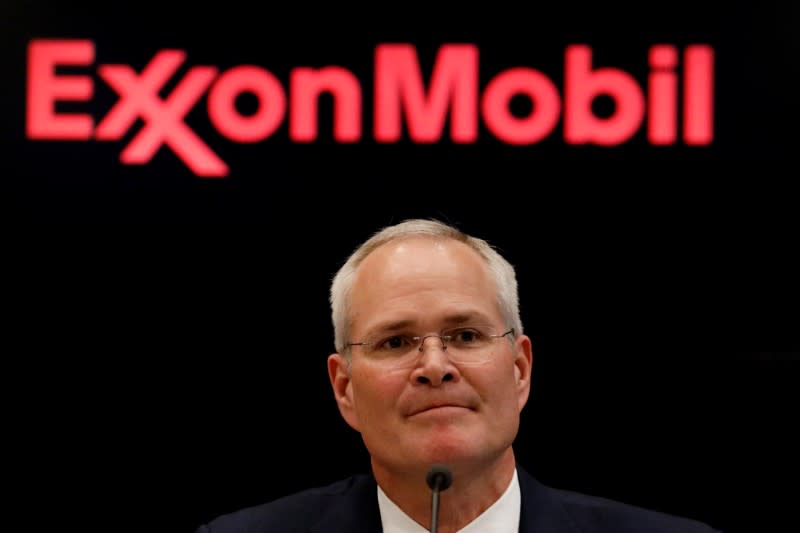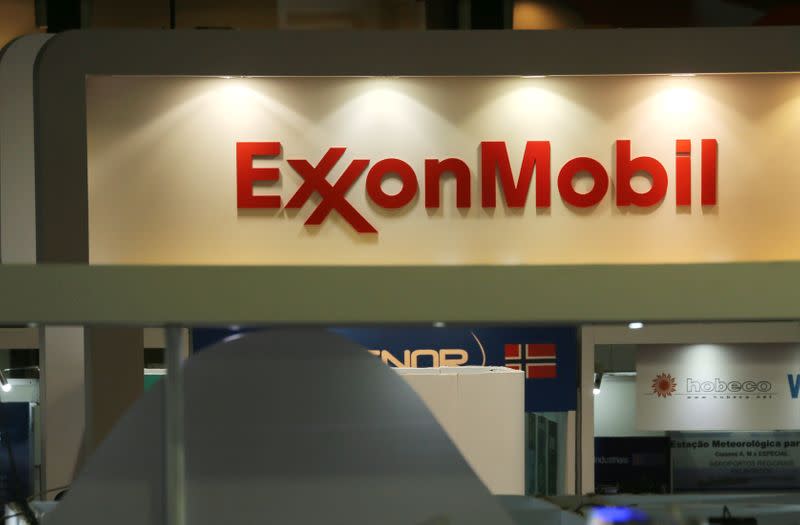Exxon to push ahead with spending plans despite investor concerns
By Jennifer Hiller
NEW YORK (Reuters) - Two years into an ambitious growth plan to revive earnings at the largest U.S. oil company, Exxon Mobil Corp <XOM.N> said on Thursday it would stick to its plans to "lean in" to spending even as its shares have lagged those of competitors, which are cutting costs.
Oil prices have fallen more than 20% this year, natural gas is at its lowest price since the 1990s and the industry's long-term outlook is clouded by a push toward cleaner fuels. The entire oil industry has fallen out of favor with investors, but Exxon, once the industry’s cash flow and profit leader, has tumbled particularly hard.
The company is "mindful of the current market environment," but will stay with its strategy of "leaning in to this market when others have pulled back," Exxon Chief Executive Darren Woods said at the company's annual investor day meeting. He first laid out plans to improve profit through investment in 2018, and Thursday's message did not diverge from that.
The industry faces a drop in demand for its products this year as the coronavirus spreads globally, but "the longer term horizon is more clear," Woods said, arguing that improving living standards mean the world will need more oil.
But Exxon's total share return is minus 26% over the last five years, far behind the other global oil majors, according to Refinitiv Eikon data, while the broader S&P 500 Index <.SPX> has returned 49%.
The company plans to spend between $30 billion and $35 billion a year through 2025. Spending will rise from $31 billion last year to about $33 billion this year, though Woods said that number could dip if the company needs to adjust for market conditions or if costs come in lower.
Exxon is "playing the long game," said Anish Kapadia of Palissy Advisors, hoping that its peers' underinvestment means commodity prices will rise and it will profit.
"However, this is not a strategy that investors are going to buy in to today as they are more focused on where commodity prices are at currently," Kapadia said, adding, "There is a fear in the market that global demand for hydrocarbons will stagnate or fall" given investor focus on climate.
Investors, including the world's top asset manager BlackRock, have warned company boards to step up efforts to tackle climate change.
Exxon is “pursuing a strategy that is destructive of both shareholder value and the planet,” said Edward Mason, head of responsible investment at Church Commissioners for England who co-leads climate talks with Exxon and attended Thursday's meeting.
Some European oil companies have set ambitious climate goals, but Woods said Exxon was focused on reducing its own emissions and would not engage in a "beauty match" with its peers.
Exxon is likely "in for another tough year," said Biraj Borkhataria, an analyst with RBC Europe Limited. With weak oil and gas prices and muted refining margins, Exxon will "barely" cover its capital spending with free cash flow and its dividend coverage will be "the worst" among the major oil companies, he said.
Its growth plans include a big bet on U.S. shale, where output has surged, making the United States the world’s largest oil producer, and on Guyana, where an Exxon-led consortium has made one of the biggest discoveries in years.
In the Permian Basin, the top U.S. shale field, Exxon has been expanding production rapidly and expects to produce around 360,000 barrels per day this year. It slightly slowed its aggressive pace, the first such move by an oil major in the field as smaller companies slash budgets and lay down equipment.
Exxon has 58 drilling rigs at work now, but said it will drop that number by 20% this year as it picks up drilling speed.
It is racing its closest U.S. rival, Chevron Corp <CVX.N>, to reach 1 million barrels of oil-equivalent per day there, and Exxon said it still will surpass that target by 2024.
On Tuesday, Chevron said it had up to $80 billion in its war chest that it could use for shareholder returns over the next five years, regardless of oil prices.
(Reporting by Jennifer Hiller in New York, Shariq Khan in Bengaluru and Ron Bousso in London; Editing by Jonathan Oatis and Matthew Lewis)


